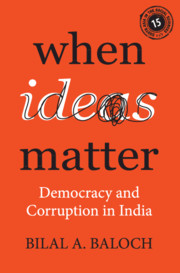Book contents
- Frontmatter
- Dedication
- Contents
- List of Table
- Preface
- Acknowledgments
- List of Abbreviations
- 1 Introduction
- 2 A Constructivist Approach to Political Behavior in India
- 3 The Emergency and the Jayaprakash Narayan Movement
- 4 India under Gandhi: Populism and Partisans
- 5 Checks and Balances and the India Against Corruption Movement
- 6 United Progressive Alliance: Technocrats and Transformations
- 7 The Politics of Ideas in India and Developing Democracies
- Appendices
- Bibliography
- Index
4 - India under Gandhi: Populism and Partisans
Published online by Cambridge University Press: 30 June 2021
- Frontmatter
- Dedication
- Contents
- List of Table
- Preface
- Acknowledgments
- List of Abbreviations
- 1 Introduction
- 2 A Constructivist Approach to Political Behavior in India
- 3 The Emergency and the Jayaprakash Narayan Movement
- 4 India under Gandhi: Populism and Partisans
- 5 Checks and Balances and the India Against Corruption Movement
- 6 United Progressive Alliance: Technocrats and Transformations
- 7 The Politics of Ideas in India and Developing Democracies
- Appendices
- Bibliography
- Index
Summary
Whenever you take a step forward, you are bound to disturb something. You disturb the air as you go forward, you disturb the dust, the ground. You trample upon things. When a whole society moves forward this trampling is on a much bigger scale and each thing that you disturb, each vested interest which you want to remove, stands as an obstacle…. You have to have moral courage then to stick to that—no matter what comes in your way, no matter what the obstacle and the opposition.
—Prime Minister Indira Gandhi, speech at Madras University, 1967Populism is a thin-centered ideology that considers society to be ultimately separated into two homogenous and antagonistic groups.
—Cas Mudde, 2004Populism and Concepts of the Nation
This chapter will present evidence for the role of ideology in the case of the Emergency. We will consider the perspectives through which decision-makers in the Congress government, chiefly Prime Minister Indira Gandhi, viewed and diagnosed the anti-corruption Jayaprakash Narayan Movement (JPM) to re-establish government credibility. Analysis of these perspectives will illustrate how Gandhi's populism, or “thin” ideology, stemmed from the Congress Party's “hard core” of secular nationalism—which placed a cognitive lock on decision-makers’ actions in a crisis environment. Decision-makers viewed the JPM and its supporters as nationalists anchored in religious majoritarianism who sidelined minority rights. The Congress's concepts of the nation allowed the executive to build solidarity within the government and to suppress the ideological “others” within the JPM. Through thickly detailed process-tracing, this chapter will demonstrate that the ideas that filled Gandhi's populism were exogenous to the crisis instigated by the JPM—that is, the events that shaped the dominant Congress Party before but specifically after its split along ideological lines in 1969—and not simply applied at the time to inflate the JPM threat.
Indira Gandhi rose to power in 1971 on a populist platform.1 After the party split of 1969, Gandhi and her Congress (R) swept political power on a garibi hatao (remove poverty) platform that advanced secularism, socialism, and minority rights. Gandhi’s populism was bound up in these concepts of the nation as enshrined in the Congress Party:
The unity of India is in many ways due to the unity and strength of the Congress.
- Type
- Chapter
- Information
- When Ideas MatterDemocracy and Corruption in India, pp. 89 - 134Publisher: Cambridge University PressPrint publication year: 2021



